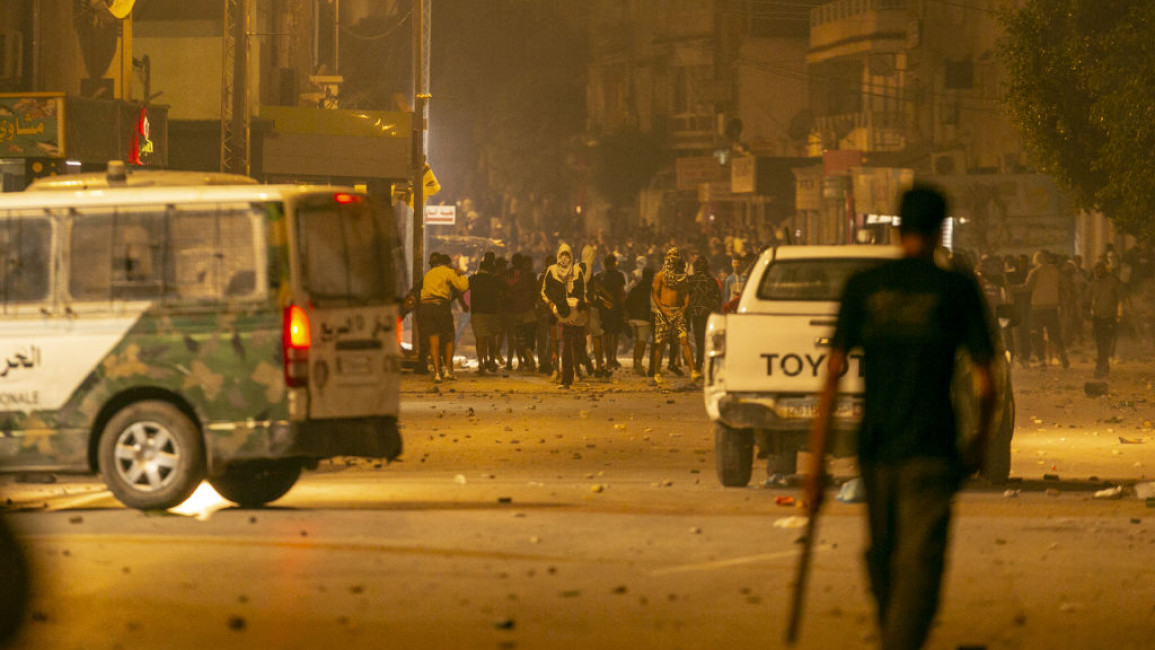Tunisia: 6 Protesters arrested, Tear Gas used
Newslooks-
The Tunisian authorities announced on Sunday that they had arrested six people on charges of attacking private and public property during clashes between security forces and protesters west of the capital, Tunis, Anadolu has reported. Security forces used rubber bullets and tear gas to disperse the protesters, who in turn responded by throwing stones, as reported by the Middle East Monitor. According to The New Arab Journal, Tunisian security forces continued attacks on anti-government protesters for the third day in a row in the capital Tunis on Sunday evening.
![Protesters clash with police as they gather to protest the death of 17-year-old young man at hospital in Tunis, Tunisia on October 15, 2022. [Yassine Gaidi - Anadolu Agency]](https://i0.wp.com/www.middleeastmonitor.com/wp-content/uploads/2022/10/AA-20221016-29169777-29169740-TUNISIAN_PROTESTERS_CLASH_WITH_POLICE_OVER_THE_DEATH_OF_YOUNG_MAN.jpg?resize=1200%2C800&quality=85&strip=all&zoom=1&ssl=1)
Protesters clash with police as they gather to protest the death of 17-year-old young man at hospital in Tunis, Tunisia on October 15, 2022. [Yassine Gaidi – Anadolu Agency] October 17, 2022 at 3:03 pm
The spokesman for the General Administration of the National Guard, Hossam Eddine Jababli, said that the security forces “countered attacks against private and public properties the past two nights [Friday and Saturday] in the Tadamon neighbourhood and six people were arrested.” Jababli added that Molotov cocktails were seized, and an unusable private car was burned. “Two members of the National Guard units were injured.”
On Saturday evening, Tunis witnessed violent confrontations for the second night between security forces and hundreds of protesters who gathered for the funeral of a young man. He died of neck and back injuries after being transferred to a hospital in the capital three weeks ago. Reports differed about the cause of his death; some say that a security patrol shot him, but others say that he fell while trying to climb a wall to escape the patrol.
The protesters held the security forces responsible for his death. The Ministry of the Interior did not comment.
Tear gas was used to disperse protesters in Tunis, reported The New Arab’s Arabic sister service, Al-Araby Al-Jadeed, which follows a deterioration in the country’s social and economic crisis.
“The situation is delicate and the confrontations, according to most of the youth, will continue,” said Maher, a young man from one neighbourhood where protests took place.
Tunisia has witnessed continued economic stagnation following a power grab by President Kais Saied.
Several neighbourhoods in Tunis were closed after rubber tyres were set alight resulting in some cars catching fire.

The death of Malek Sellimi has fuelled the demonstrations, according to one young man [Yassine Gaidi/Anadolu Agency/Getty-archive]
Tunisian security forces continued attacks on anti-government protesters for the third day in a row in the capital Tunis on Sunday evening.
Tear gas was used to disperse protesters in Tunis, reported The New Arab’s Arabic sister service, Al-Araby Al-Jadeed, which follows a deterioration in the country’s social and economic crisis.
“The situation is delicate and the confrontations, according to most of the youth, will continue,” said Maher, a young man from one neighbourhood where protests took place.
Tunisia has witnessed continued economic stagnation following a power grab by President Kais Saied.
Several neighbourhoods in Tunis were closed after rubber tyres were set alight resulting in some cars catching fire.
“The more force is used by security services, the more the protesters will revolt,” Maher added.
He said that the death of Malek Sellimi fuelled the demonstrations, a 24-year-old man who was pursued by Tunisian security before falling into a coma.
After his funeral on Friday, there were protests and congestion in two neighbourhoods in the capital.
The Tunisian interior ministry’s information office chief, Faker Bouzghaia, said a number of “infiltrators” participated in the protests on Saturday in the Al-Tadamon and Al-Intilaqah neighbourhoods, claiming they intended to carry out thefts and were not motivated by political grievances.
Bouzghaia claimed that money was seized from several people who intended to distribute it to protesters, saying that and said that reports of Sellimi being attacked by security forces “contains many inaccuracies”.
“A patrol stopped Malik Sellimi and his two friends as a routine procedure but he fled and jumped from a high wall and fell,” he said in a statement.
“All necessary precautions were taken, and the public prosecution was consulted.”
Bouzghaia said an injured Sellimi was taken swiftly to the hospital.
“[The Tunisian interior ministry] possesses the records of Malik Sellimi before his death and the two young people who were with him testified that he was not subjected to violence,” he said in a statement.
Tunisia was viewed as the Arab Spring’s biggest success story until President Saied seized wider powers in 2021, viewed as a coup by many Tunisians.
The president has since pushed through a constitution granting him autocratic powers.
Despite Tunisia’s success in democracy until the 2021 dissolving of parliament, the country has still been hit by a floundering economy and high unemployment.








